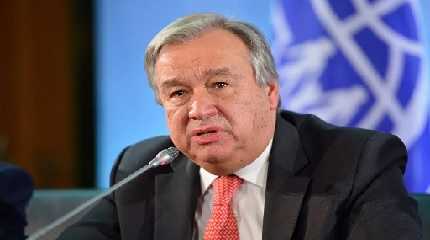
UNITED NATIONS, Apr 05 (APP):United Nations Secretary-General Antonio Guterres Wednesday strongly condemned a decision by the Taliban authorities to ban Afghan women from working for the UN, and called for the decision to be immediately revoked, his spokesperson said.
“This is a violation of the inalienable fundamental human rights of women,” spokesperson Stephane Dujarric said in a statement issued at UN Headquarters in New York.
“It also violates Afghanistan’s obligations under international human rights law, and infringes on the principle of non-discrimination, which is a core tenet underpinning the United Nations Charter,” the statement said.
“Female staff members are essential for the United Nations operations, including in the delivery of life-saving assistance. The enforcement of this decision will harm the Afghan people, millions of whom are in need of this assistance.
“The secretary-general calls on the Taliban to immediately revoke the decision and reverse all measures that restrict women’s and girls’ rights to work, education and freedom of movement.”
Some 23 million people – more than half of Afghanistan’s population – need help, according to the UN.
Despite initial promises of a more moderate rule than during its previous stint in power, the Taliban have imposed tough measures since taking over the country in 2021 as US and NATO forces were pulling out of Afghanistan after two decades of war.
Girls are banned from education beyond sixth grade. Women are barred from working, studying, traveling without a male companion, and even going to parks.
Afghan women are already barred from working at national and international non-governmental organizations, disrupting the delivery of humanitarian aid, but the ban did not previously cover working for the UN.
On its part, Pakistan has been calling on the Taliban to reverse restrictions on women and girls in the country.
Speaking at a press briefing on the outcome of the Women in Islam Conference in New York last month, Foreign Minister Bilawal Bhutto Zardari said the actions on Afghan women and girls were not the norm within the Muslim world. “There is no other country on the planet, Muslim or otherwise, that condones depriving women and girls from the right to education,” FM Bilawal had said.
The latest decision focussed on the UN staff, “is just the latest in a disturbing trend of edicts, undermining the ability of aid organizations to reach those most in need”, Spokesman Dujarric at his regular noon briefing on Tuesday.
“We will continue to pursue all avenues to ensure that we can reach the most vulnerable people, especially women and girls,” he added.
In March, Roza Isakovna Otunbayeva, UN Special Representative and head of the UNAMA Assistance Mission, told the Security Council that Afghanistan under the Taliban remained the “most repressive country in the world [for] women’s rights”.
“At a moment when [the country] needs all of its human capital to recover from decades of war, half of its potential doctors, scientists, journalists, and politicians are shut away in their homes, their dreams crushed, and their talents confiscated,” she said in a briefing to the Council.
Speaking to journalists at UN Headquarters in New York on Wednesday ahead of a sustainable development report briefing in London, the UN Deputy Secretary-General Amina Mohammed reminded that she had met many of the women now facing a ban and the loss of their livelihoods, in a visit to Afghanistan at the beginning of the year.
“We reiterate that both Afghan women and men are essential to all aspects of our work,” she said, adding that the UN “was taking all possible measures right now to support our national female staff at this difficult time.”
She said UN national female staff will continue to receive their salaries, but until further clarification is received, all national staff – both men and women – are being told not to report to the office.
She said she had been involved in a meeting with the Foreign Affairs minister of the de facto authorities earlier Wednesday morning, and pledged that UN leadership would “continue to engage” with Taliban representatives, “as well as neighbouring countries” to resolve the latest human rights infringements.
The President of the General Assembly, Csaba Korosi, also strongly condemned the move, calling it a “blatant violation” of women and girls’ human rights.
“The consequences of this decision would harm the Afghan people, in particular the most vulnerable segments of the population”, he said, noting that Afghanistan needs to get on the path towards sustainable development, “and for that, it should mobilize the country’s full potential.”




